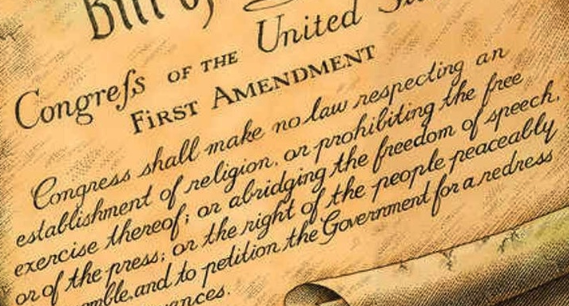The fact that Christianity is not specifically mentioned does not mean that the First Amendment is hostile to Christianity.
A Bill of Rights was added to the Constitution in 1791 because many believed the Constitution was not specific enough regarding the rights of the states and the people. The individual states felt that a Bill of Rights “would protect fundamental rights against interference by the new federal government.”[1] The purpose of the Bill of Rights, therefore, was to restrict the federal government from exercising its power in certain areas. In the case of the First Amendment, the power of Congress was limited in the areas of religion, free speech, and assembly.
The “establishment clause” was a protection that the leaders in the states wanted so that they would not suffer the same religious persecutions that their forefathers had experienced. It was imperative that the newly-formed powers of the federal government could not be used to force a certain national religious denomination on any people or infringe on religious affairs of any kind. The people then would be free to live out their religious convictions in peace without interference from Congress. “It would not have occurred to them [representatives from the states] to attempt to re-establish that which the colonists had fought against, namely, religious control and establishment by the central government.”[2]
The First Amendment does not require the federal government to be secularized. The early history of the United States, both before and after ratification of the Bill of Rights, shows that no secularization took place. Congress began its sessions with divine worship. After the adoption of the First Amendment, the federal government reenacted the policy of the Northwest Ordinance by declaring: “Religion, morality, and knowledge being necessary to good government and the happiness of mankind, schools and the means of education shall forever be encouraged.” Moreover, national days of prayer and fasting were instituted by most of our presidents and are continued to this day.

God and Government
With a fresh new look, more images, an extensive subject and scripture index, and an updated bibliography, God and Government is ready to prepare a whole new generation to take on the political and religious battles confronting Christians today. May it be used in a new awakening of Christians in America—not just to inform minds, but to stimulate action and secure a better tomorrow for our posterity.
Buy NowThe fact that Christianity is not specifically mentioned does not mean that the First Amendment is hostile to Christianity. The First Amendment was intended to limit Congress in its use of power regarding religion, including the Christian religion. The only authority that the federal government has is specified in the Constitution.
Click here for today’s episode
Click here to browse all episodes of The Gary DeMar Podcast
[1] Whitehead, Separation Illusion, 68.
[2] Rushdoony, Nature of the American System, 3.

